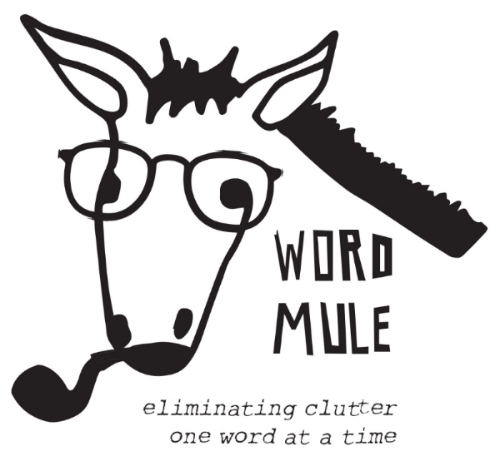For writers, putting a story together is a lot like working on a puzzle. You find the corner pieces, arrange them, link a few more bits together, shift them to where you think they might belong, review the photo on the box and then ultimately give up. That last part is a joke. An unfinished puzzle, an unfinished story—that’ll haunt. And there are few greater follies than inviting a haunting (but if you are in fact inhabited by a ghoul, the Mules can exorcise that demon).
A great way to wrap that writing project, to finesse all those story pieces into their proper slot, is to sit down at the same time every single day and pop out some words. Follow that path and you might pull a Geoff Collins. What’s a Geoff Collins? That’s ten books in print. Geoff hasn’t pulled it off yet, but he’s on the fertile verge—his tenth book will be out later this year.
The Mules have had the pleasure of working with Geoff on the bulk of his projects. But as is often the case, we know the work better than the author. This little interview serves to narrow that gap.
****
What role does writing serve in your life? I get the sense that you’re always working on a story. We personally feel like we’re on sturdier footing when we’re tweaking a project, whether we’re actually writing or merely mentally developing a scene.
As a CEO of an advertising company and a teacher, I’ve always enjoyed the creative process. While I have written most all of my life, my retirement has given me the time to both satisfy my need to be creative along with filling much of my day with something I truly enjoy. Most of the writing I’ve done in my business career was technical in nature. My experience as a teacher, and my retirement have allowed me to explore the fictional writing genre.
I have always been an avid reader and enjoy the way truly good writers navigate me through their stories. I’m constantly looking for new ideas for my next project in both the books I read and the people and places I interact with. I do believe there’s a story in every person you meet and place you visit.
Can you tell us a bit about your writing habits? Do you devote a chunk of each day to your fiction?
In business, as in teaching, organizing my time was always an important aspect of whatever success I have enjoyed. I have been retired for a few years now, and writing gives me the opportunity to add structure to my days while fulfilling the need for creativity. I write most every day beginning around 8:00 a.m.—sometimes staying at it for an hour or two, and sometimes well into the afternoon.
How do you do research for your books? People-watching in coffee shops? Furious Googling? Calling up every doctor/lawyer/longshoreman/busboy/psychiatrist/IT specialist that you know and asking them uncomfortable questions about what they would do if a murder victim showed up on their front stoop?
I spend a lot of time googling. While I write fiction, I try to make everything as accurate as possible. I also have a friend who was a police officer and often bounce things off of him.
Your last few books have been set in the Charleston area, where you live. Does that have an impact on your day-to-day life? For example, when you’re at the grocery store, do you envision a police chase whipping through the cereal aisle?
Definitely. It’s much easier to write about a particular scene in a book if I’ve actually been there and experienced the particulars of its surroundings.
When you first came to the Mule, you were working on young-adult mysteries. Now you’ve transitioned into the gritty world of police procedurals. A couple questions here:
a) Why were you initially drawn to YA?
That’s easy…I taught 4th grade and would write short stories for my kids. It naturally evolved into YA stories.
b) What inspired your transition into the realm of mob hits and drug trafficking?
I have always enjoyed murder/mysteries and detective stories and normally they are my choice when selecting something to read.
What’s on the horizon for you, writing-wise? While we thoroughly enjoy your current work and see you making great strides as a writer, we’d love to see you dip into something a little more personal; do you ever consider shifting gears and working on a story set a little closer to your emotional core?
Actually, I have considered something different. I’m close to finishing the third book in the Adam Stone series entitled The Sandman. That will make it six straight detective murder/mystery efforts. Maybe move back to YA—something drawing on my experience as a teacher or perhaps sports oriented. We’ll see.
What are you reading now? And what are some of your all-time favorite novels?
I took a break from my normal reads and just finished Trevor Noah’s biography. I have several authors I enjoy—most all in the detective murder-mystery and legal thriller category. My favorite author is Michael Connelly.
